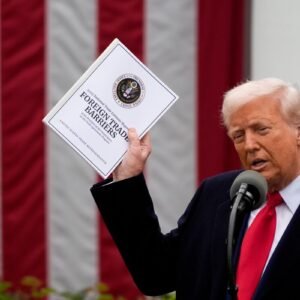In a bold move that could reshape the global trade landscape, U.S. President Donald Trump announced on Wednesday a sweeping 10% baseline tax on imports from all countries, alongside significantly higher tariff rates on nations with trade surpluses with the U.S.
This decision threatens to escalate global trade tensions and could have far-reaching economic implications.
During his speech at the White House, Trump showcased a chart detailing the new import tax rates: 34% on goods from China, 20% on the European Union, 25% on South Korea, 24% on Japan, and 32% on Taiwan.
He framed the move as a response to decades of economic disadvantage, stating that the U.S. had been “looted, pillaged, raped, and plundered” by other nations under the current trade system.
To enforce these tariffs, Trump declared a national economic emergency, with the administration estimating that the new policies will generate hundreds of billions of dollars in annual revenue.
While the move is aimed at bringing manufacturing jobs back to the U.S., experts warn it could lead to inflationary pressures as prices on essential goods—ranging from cars to clothing—spike.
How Will The US Import Tariffs Affect Egypt?
Increased Costs for Imported Goods:
Egypt relies heavily on imports for a wide range of products, including machinery, electronics, and raw materials.
If the U.S. tariffs drive up global prices—especially on goods from China and the EU—Egyptian businesses and consumers may see costs rise as well.
Disruptions in Global Trade:
A trade war between major economies could cause supply chain disruptions, impacting the flow of goods and creating uncertainties for Egyptian importers and exporters.
Delays or price fluctuations could hit industries like manufacturing and construction particularly hard.
Opportunities for Egyptian Exports?
On the flip side, if U.S. importers look for alternatives to higher-tariff countries, Egypt could benefit in specific sectors.
Egyptian textiles, agricultural products, and some industrial goods may become more attractive to American buyers seeking to avoid tariffs on Chinese and European products.
Currency and Inflation Concerns:
If global trade tensions lead to market instability, fluctuations in the U.S. dollar could impact Egypt’s foreign exchange reserves.
A stronger dollar would make imports more expensive, adding further strain to an already pressured economy.
Potential Shift in Foreign Investments:
Multinational companies may reconsider their supply chains due to higher costs in traditional manufacturing hubs.
If Egypt positions itself as an alternative destination, this could attract foreign direct investment in sectors like textiles, chemicals, and electronics assembly.
What’s Next?
Egyptian policymakers and businesses should closely monitor how the U.S. tariffs evolve and assess the potential economic impact.
Diversifying trade partners, encouraging local manufacturing, and strengthening regional trade agreements could help mitigate risks.
As the global economy braces for the fallout, one thing is clear: trade wars don’t just affect the countries imposing tariffs—they send shockwaves worldwide, including to economies like Egypt that must now adapt to an uncertain future.





